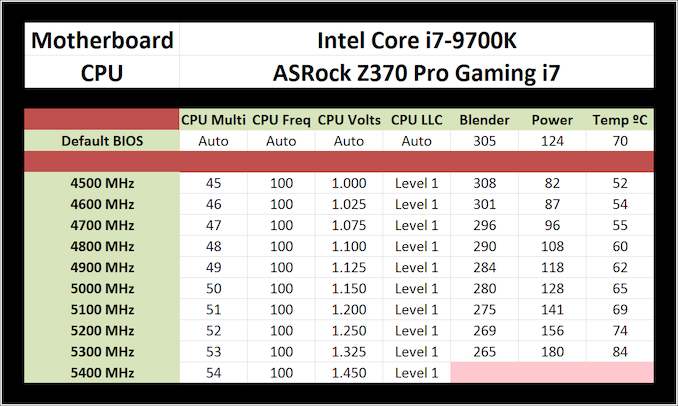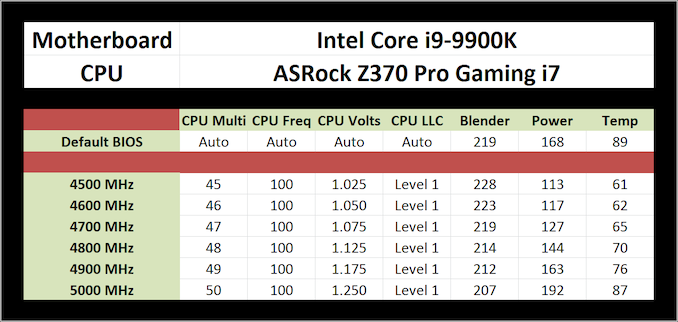The Intel 9th Gen Review: Core i9-9900K, Core i7-9700K and Core i5-9600K Tested
by Ian Cutress on October 19, 2018 9:00 AM EST- Posted in
- CPUs
- Intel
- Coffee Lake
- 14++
- Core 9th Gen
- Core-S
- i9-9900K
- i7-9700K
- i5-9600K
Overclocking
With the upgraded thermal interface between the processor and the heatspreader, from paste to solder, Intel is leaning on the fact that these overclockable processors should be more overclockable than previous generations. We’ve only had time to test the Core i9-9900K and i7-9700K on this, so we took them for a spin.
Our overclocking methodology is simple. We set the Load Line Calibration to static (or level 1 for this ASRock Z370 motherboard), set the frequency to 4.5 GHz, the voltage to 1.000 volts, and run our tests. If successfully stable, we record the power and performance, and then increase the CPU multiplier. If the system fails, we increase the voltage by +0.025 volts. The overclocking ends when the temperatures get too high (85C+).
For our new test suite comes new overclocking features. As mentioned in the previous page, our software loading for power measurement is POV-Ray, which can thrash a processor quite harshly. POV-Ray also does a good job on stability, but is not a substantial enough test – for that we use our Blender workload, which pushes the cores and the memory, and lasts about 5 minutes on an 8 core processor.
Results as follows:
For the Core i7-9700K, we hit 5.3 GHz very easily, for a small bump in power and temperature. For 5.4 GHz, we could boot into the operating system but it was in no way stable – we were ultimately voltage/temperature limited at this case. But an eight core, eight thread 5.3 GHz CPU at 180W for $374? Almost unimaginable a year ago.
Overclocking the Core i9-9900K was not as fruitful. The best bit about this overclock is the 4.7 GHz value: by using our own voltage settings, we reduced power consumption by 41W, almost 25% of the total power, and also reduced temperatures by 24ºC. That's a safe idea. Even 4.8 GHz and 4.9 GHz was reasonable, but the temperatures at 5.0 GHz might not be for everyone. When all cores and threads are loaded, this is one warm chip.












274 Comments
View All Comments
The Original Ralph - Saturday, October 20, 2018 - link
sorry, B&H's availability date should be JAN 1, 2100eastcoast_pete - Saturday, October 20, 2018 - link
JAN 1, 2100? Intel's manufacturing problems must be at lot more serious than we knew (:I wonder if the 9900K will be supported by "Windows 21" when they finally ship?
cubebomb - Saturday, October 20, 2018 - link
you guys need to stop posting 1080p benchmarks for games already. come on now.gammaray - Sunday, October 21, 2018 - link
I agree, 1440p and higher, especially with the top CPUsmapesdhs - Sunday, October 21, 2018 - link
They would of course respond that they have to show 1080p in order to reveal CPU differences, even if the frame rates are so high that most people wouldn't care anyway. I suppose those who do game at 1080p on high refresh monitors would say they care about the data, but then the foundation of the RTX launch is a new pressure to move away from high refresh rates, something the aforementioned group of gamers physically cannot do.piroroadkill - Monday, October 22, 2018 - link
They need to show a meaningful difference between CPUs. setting a higher resolution makes the tests worthless, as you'll just be GPU bottlenecked.eva02langley - Monday, October 22, 2018 - link
They are important since they bring in perspective CPU bottleneck, however it is widely overpreached.1080p, 1440p and 2160p at max settings... enough said. Without multiple resolutions benchmarks, it is impossible to get a clear picture of the real performances to expect from a potential system.
However, basically, a value rating system is now MANDATORY. It doesn't make any sense that the 9900k received 90% + score on Toms and WCCF. They offer abysmal value for gamers, so it is not "The Best Gaming CPU", however it is the "strongest"
DominionSeraph - Monday, October 22, 2018 - link
It's $110 over the i7. If you're looking at a $2500 i7 rig, going to $2610 with an i9 is a 4% increase in price. Looks to me like it generally wins by over 4%. That's a really good value for a content creator since it stomps the i7 by over 20%.Chestertonian - Wednesday, February 27, 2019 - link
No kidding. Why are there barely any 1440p benchmarks, but there are tons of 8k benchmarks? I don't get it.avatar-ds - Sunday, October 21, 2018 - link
Something's fishy with the 8086k consistently underperforming the 8700k in many (most?) gaming tests by more than a margin of error where differences are significant enough. Undermines credibility of the whole thing.